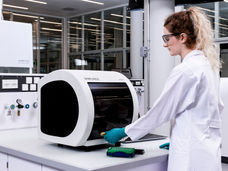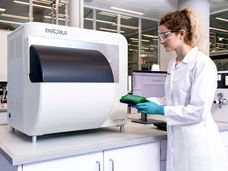Corning Awarded Additional Patent for Label-free Drug Development Technology
Removing biomolecular labels and purification steps improves data quality and biological relevance of assay results
Advertisement
Corning Incorporated announced that the United States Patent and Trademark Office issued the company an additional patent related to the Corning(r) Epic(r) System that deals with the study of unpurified biological samples with label-free biosensor technology. This advanced discovery will enable researchers to study the interactions between drug targets and more biologically relevant samples such as cell supernatants and cell lysates. It will also help to improve overall data quality and reduce the time and expense associated with identifying and labeling drug targets.
The study of molecular interactions in high-throughput screening has become an essential part of the drug discovery process. Many conventional screening methods require highly purified molecules as well as complex labeling methods, both of which can compromise the biological relevance of the interactions being studied.
Applications such as hybridoma screening and cell lysates require the ability to detect biomolecular interactions in complex samples. "The ability of the Corning Epic System to screen complex samples such as cell lysates and supernatants in drug discovery represents a significant step forward in rapidly identifying novel and biologically relevant interactions," said Mannix Aklian, commercial development manager and the Corning inventor responsible for this new patent.
This latest patent, U.S. Patent No. 7,349,080 entitled "Label-independent Detection of Unpurified Analytes," adds to Corning's patent portfolio related to the Epic System and label-free, optical biosensor technology. Previously, Corning acquired exclusive rights to U.S. Patent No. 5,738,825, a fundamental patent related to optical-based biosensors in a microplate format.
Most read news
Other news from the department research and development
These products might interest you

Octet R2 / Octet R4 / Octet R8 by Sartorius
Full power on 2, 4 or 8 channels: Label-free and GxP-compliant analysis of molecular interactions
Innovative label-free real-time protein quantification, binding kinetics and rapid screenings

Octet RH16 and RH96 by Sartorius
Efficient protein analysis for process optimisation and manufacturing control in high-throughput
Label-free protein quantification and characterization of protein-protein interactions

Octet SF3 by Sartorius
Surface Plasmon Resonance (SPR) using Single Dynamic Injections for Kinetics and Affinities
Curvature is Key - Adding a ‘Third Dimension’ to the Binding Curve

Get the life science industry in your inbox
By submitting this form you agree that LUMITOS AG will send you the newsletter(s) selected above by email. Your data will not be passed on to third parties. Your data will be stored and processed in accordance with our data protection regulations. LUMITOS may contact you by email for the purpose of advertising or market and opinion surveys. You can revoke your consent at any time without giving reasons to LUMITOS AG, Ernst-Augustin-Str. 2, 12489 Berlin, Germany or by e-mail at revoke@lumitos.com with effect for the future. In addition, each email contains a link to unsubscribe from the corresponding newsletter.



























































